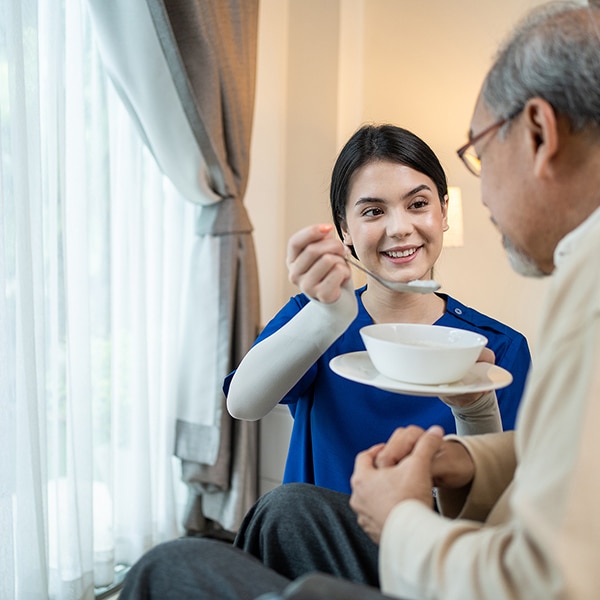We have a variety of compassionate and experienced nurses and caregivers that are dedicated to helping you or your loved one thrive at home. Our team includes; Care Managers, Registered Nurses (RN)Licensed Practical Nurses (LPN), Caregivers, Homemakers, (Companion Care and Personal Care), Certified Nurse assistants (CNA), Certified Medication Technicians (CMT), and Home Health Aides (HHA). We offer visiting nurses and private duty nursing for patients who require skilled nursing care or prefer personalized care from their very own private nurse. It can be challenging to manage illness, injury, or chronic disease at home. The personal attention of a home health nurse can make a big difference.
Care at Home offers both short and long visits, frequent or infrequent visits, and short-term or long-term care. Our areas of focus include; Skilled Nursing Care (as directed by your physician), Alzheimer’s & Dementia Care at Home, ALS and Parkinson’s Home Care, 24-hour and Live-in Home Care, Pediatric Care, and Veterans’ Care. We offer Care Management services and will assist in Senior Moving or Downsizing. You’ll love our flexibility and affordability. Choosing the right home care agency is key to optimum health outcomes. With Care at Home, what matters the most is your well-being and achieving your optimal health
One of the most attractive solutions for seniors who need help with daily living is live-in home care. With live-in home care, a qualified caregiver lives with the person to help them with daily activities and provide companionship.
Live-in home care for the elderly is usually provided by a home care provider who lives with your loved one during the week. This person will take care of tasks such as laundry, light housekeeping, assisting with or preparing meals, help with personal hygiene tasks such as bathing and dressing, and being a companion. A live-in care provider stays overnight and sleeps at the same time as their client. In most arrangements, an alternative caregiver stays on the weekends so that there is constant care while giving each caregiver time off.
There are many advantages to home care for the elderly. Perhaps most important is the ability to keep your parent or loved one in their own home. According to the AARP, 87 percent of individuals over 65 years of age prefer to “age in place,” a term referring to growing older in their own homes and communities (1)
Being surrounded by personal possessions and the memories of a lifetime is comforting, while the move to an assisted living facility can be traumatic. Live-in care is less expensive than most assisted living communities and lets your parent remain in his or her neighborhood, maintaining established friendships.
Independence is highly valued, and the elderly fear its loss. Remaining at home gives them the freedom to make choices such as when to bathe, what snacks to eat, and when to have visitors. Assisted living facilities limit these kinds of options, which can be a difficult adjustment for those who have made their own decisions all their lives.
Compared to a nursing home or assisted living, in-home care is more affordable. There is also more flexibility, as you can determine whether in-home care is needed around the clock or just a few hours each day to attend to specific tasks. The cost of an at-home caregiver can be half of what you will pay for assisted living and a third of what you might pay for a nursing home.
According to Marty Bell, executive director of the National Aging in Place Council, “There are a lot of people who argue aging in place is the solution to the sustainability of Medicare and Medicaid, that if enough people could be taught to age in place, and it's available to them, that it can really bolster the sustainability and strength of the Medicaid and Medicare program, so it’s kind of a win-win for the individuals and the society as a whole.” (2)

Looking for in-home care in the Silver Spring MD area? Learn more about our non-medical home care options including companionship, safety, meal preparation, and more.
Read the kind words from previous clients. Our testimonials and reviews help families discover how dedicated we are to customer satisfaction.

The level of care needed and your budget will determine what is included in live-in home care. Typically, the duties of a live-in care provider will consist of some or all of the following:
The number of services needed will determine the cost on a sliding scale. Be sure you talk to your parents about what they need and don’t need and take the time to observe them in their home to see for yourself what assistance is required.
An alternative option for your loved one if they need more care than a live-in caregiver can provide is 24-hour senior care. If an individual isn’t safe unless monitored 24/7, a team of care providers working in shifts provided constant supervision, even when the person is asleep. This is most often needed when someone has a severe health condition that requires nighttime care, such as frequent turning in bed to prevent bedsores or preventing nighttime wandering due to dementia. Twenty-four-hour care is more expensive than live-in care due to the need for a minimum of two caregivers to maintain constant coverage.
The cost of live-in care for the elderly reflects several variables, including how much care is provided, the area of the country where you live, the level of experience and education of the home health care provider, and whether you hire someone privately or through an agency.
The cost of live-in senior care is less than the cost of assisted living or a nursing home. Expect to pay between $100 and $350 per day or $15 to $25 per hour, depending on whether you pay per shift or per hour. Generally, expect to pay about $3,000-$4,000 per month for a live-in healthcare aide. If your parents or loved ones have long-term care insurance, this can help defray the costs. Offering perks such as meals and the use of a car at no cost can help reduce the overall cost in some situations.
There are other options to help cover live-in care costs, including asking family members to contribute toward the expense. Keep in mind that an in-home caregiver will free you and your family members up for other commitments, which can make it worth the investment to assist your parents or loved ones with the cost.
If your loved one owns their home, a reverse mortgage is another option. A reverse mortgage gives them a specified sum of money each month based on the equity in their home. They can use these funds to pay for their care while at home. Upon their death or move to some assisted living or a nursing facility, the reverse mortgage has to be paid back, or the house is forfeited.
Learn how Care at Home will make a difference in the life of a senior you love. Read more about what we value and our mission. This drives the process we use to provide the best service possible.
While many opt for a friend, neighbor, or family members to provide some form of in-home care for elderly loved ones, this can lead to problems.
Using a professional in-home care service offers several advantages, including thorough screening of care providers, backup caregivers when needed, trained staff, emergency availability, and certified home health aides. Working with a service in your area ensures your parent or loved one will be able to age at home for as long as possible in a safe, engaging environment.
Ready to get started? Click below and fill out our form. We will connect with you, answer your questions, and provide information on how home care works.
Licensed as a Residential Service Agency (RSA) by Maryland Department of Health and Mental Hygiene, Office of Health Care Quality. State License Number R4621.
Serving Anne Arundel County, Baltimore County, Howard County, Prince George’s County & Montgomery County.